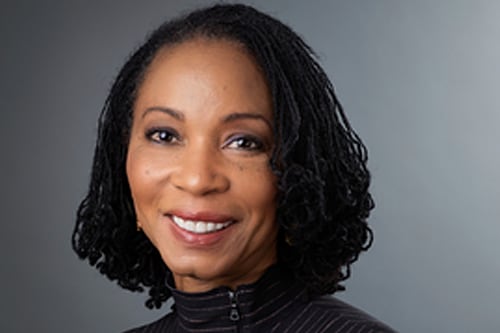Expert Perspectives: Tackling Racism as a Public Health Issue Starts at Home
Helene D. Gayle, MD, MPH

Helene D. Gayle, MD, MPH
President & CEO for The Chicago Community Trust
The death of George Floyd and countless others; the COVID-19 pandemic and its disproportionate impact on communities of color, and the recent slayings of members of the Asian community in Atlanta have all laid bare a tragic, but inescapable reality: racism, and its many manifestations, is still very much alive in America.
But while these tragedies represent visible displays of racial injustice, the underlying systemic racism that consistently devalues the lives of people of color and poses barriers to opportunity every day, remains largely invisible and unrecognized by most Americans.
Nowhere is this harsh reality truer than in the disparities we see in health outcomes between White Americans and people of color, especially Black, Latinx and Indigenous people.
As a public health community, we need to acknowledge this. We need to repair this. And we need to make it right. We will not be able to impact inequity in health status and health outcomes otherwise. But change, as is often said, must begin at home.
The reality is this: our public health institutions cannot effectively combat the race-based health inequities that plague our nation, until they address the issues of diversity, inclusion and equity within their own walls.
The data1 tell us that a diverse public health workforce is critical to our ability to address the nation’s most pressing health needs including fighting the stark inequities that COVID-19 has highlighted.
Greater diversity allows us access to a broader wealth of talent, expertise and perspectives that strengthen our ability to address health disparities, respond to emerging crises, and better protect the health of our nation2. It also places those with experience and personal connection to the lived realities of the communities we are trying to reach at the decision-making tables.
As we battle the twin epidemics of COVID-19 and racism, we, as a public health community, now have an unparalleled opportunity to create the kind of transformative change within our organizations that can accelerate these public-facing efforts.
For these reasons and more, public health organizations around the country must actively work to diversify the nation’s public health workforce. It is the right thing to do. It is also the smart thing to do if we want to find effective solutions to the nation’s health challenges. I know from my own public health experience that the conversations were different and the trust that was developed with diverse communities was enhanced because of my presence.
But while increasing diversity and the numbers of people of color at all levels of our public health institutions is critical, it is only the first step. We also must commit to making our workplaces inclusive and equitable—embracing our different experiences and supporting each person’s ability to offer their unique contributions and to thrive within their organizations.
Are we willing and open to hearing voices different than our own? Are we willing to create spaces in which people feel comfortable to express diverse perspectives? If not, the promise of diversity, inclusion and equity will not be fulfilled. To achieve this requires an organization-wide commitment to specific and measurable diversity, equity and inclusion goals and targets, including accountability tied to performance goals and other organizational incentives.
As America’s public health agency, CDC’s recent efforts to address racism as a public health issue is a strong demonstration of leadership and a powerful step forward for the nation. I am proud to be a part of a legacy of an organization that is increasingly recognizing its role in addressing racism as a public health issue.
Similarly, leaders throughout our nation’s network of state, local, tribal and territorial health departments are boldly declaring racism the public health crisis it is—inspiring long-overdue change in communities across the country.
As we battle the twin epidemics of COVID-19 and racism, we, as a public health community, now have an unparalleled opportunity to create the kind of transformative change within our organizations that can accelerate these public-facing efforts. This is important work. Work that can save lives today and prepare us for the next health crisis tomorrow.
We must act now. The health of our nation depends on it.
Helene D. Gayle is president and CEO of The Chicago Community Trust, one of the nation’s oldest and largest community foundations. An expert on global development, humanitarian and health issues, Dr. Gayle spent 20 years with the Centers for Disease Control and Prevention, working primarily on HIV/AIDS. She formed and then led the National Center for HIV/AIDS, STD and TB Prevention (now NCHHSTP). She retired from the Commissioned Corps with the rank of Rear Admiral and Assistant Surgeon General. She also worked at the Bill & Melinda Gates Foundation, directing programs on HIV/AIDS and other global health issues. For almost a decade, she led the international humanitarian and global poverty fighting organization, CARE. Named one of Forbes’ “100 Most Powerful Women,” she has authored numerous articles on global and domestic public health issues and social justice. She earned a BA in psychology at Barnard College, an MD at the University of Pennsylvania and an MPH at Johns Hopkins University. She has received 18 honorary degrees.
- Institute of Medicine. 2003. Unequal Treatment: Confronting Racial and Ethnic Disparities in Health Care. Washington, DC: The National Academies Press. https://doi.org/10.17226/10260.
- MISSING PERSONS: Minorities in the Health Professions. A Report of the Sullivan Commission on Diversity in the Healthcare Workforce. 2004 Sept, 34-42
DISCLAIMER: The “Expert Perspectives” forum invites contributors from throughout the public health community to share their thoughts and opinions on a range of issues related to health equity. The views, conclusions and opinions expressed in “Expert Perspectives,” are those of the author(s) and do not necessarily reflect the official policy or position of the U.S. Department of Health and Human Services, the Public Health Service, the Centers for Disease Control and Prevention, or the authors’ affiliated institutions.